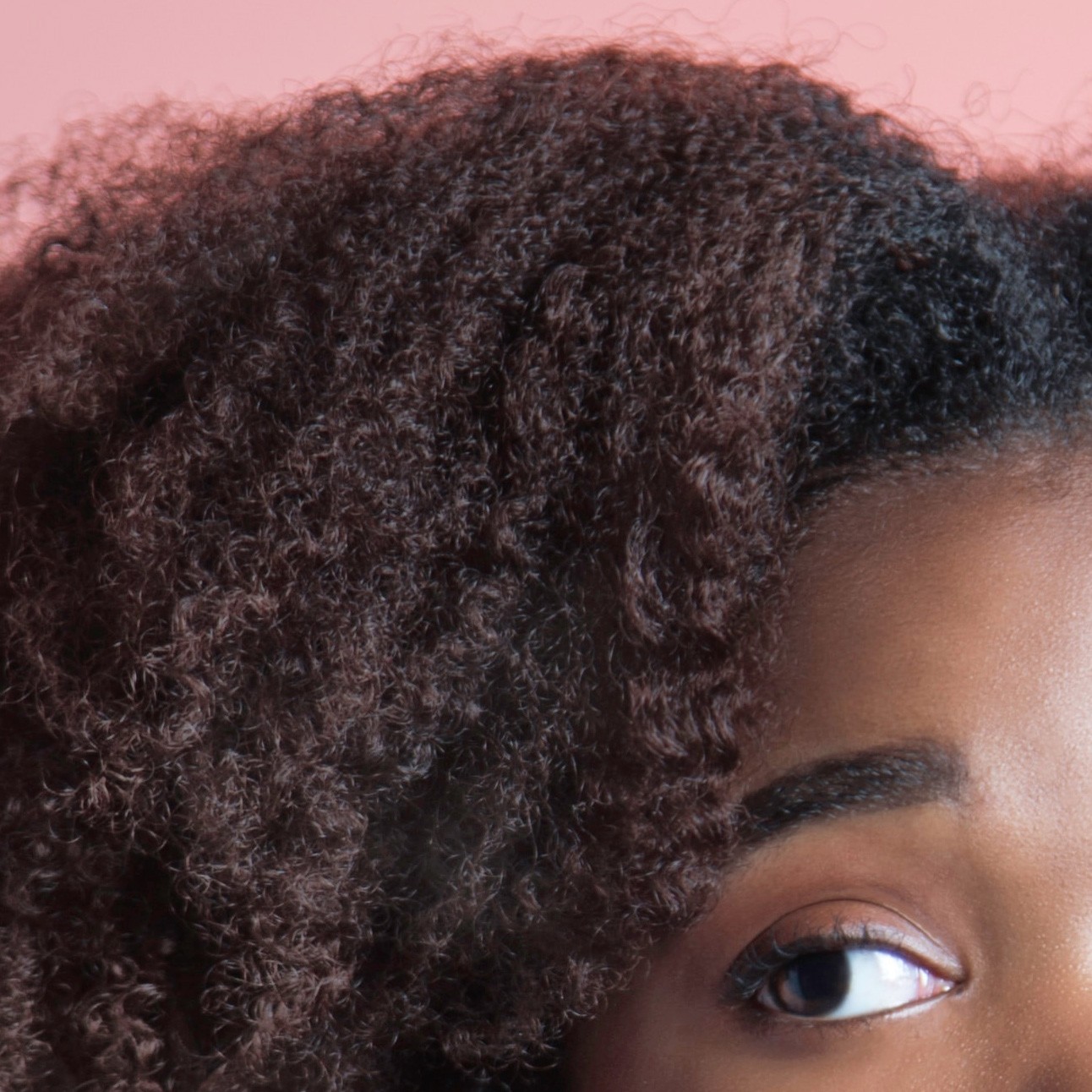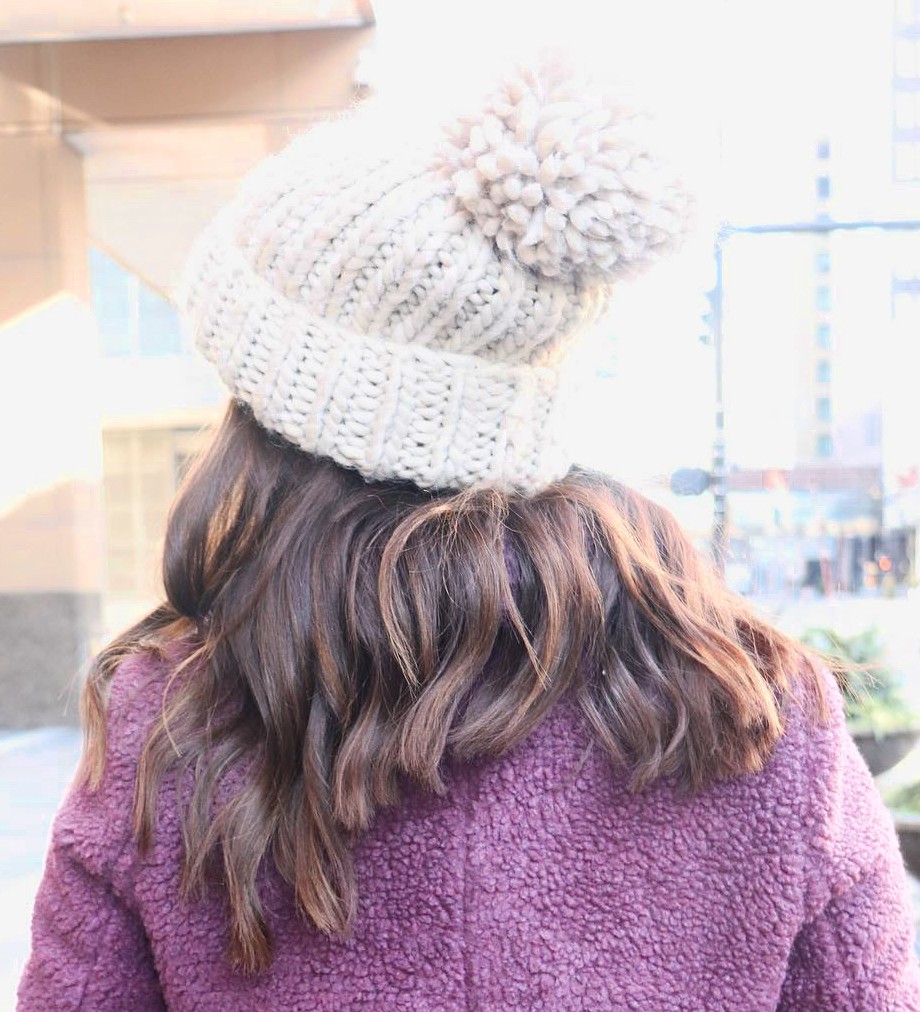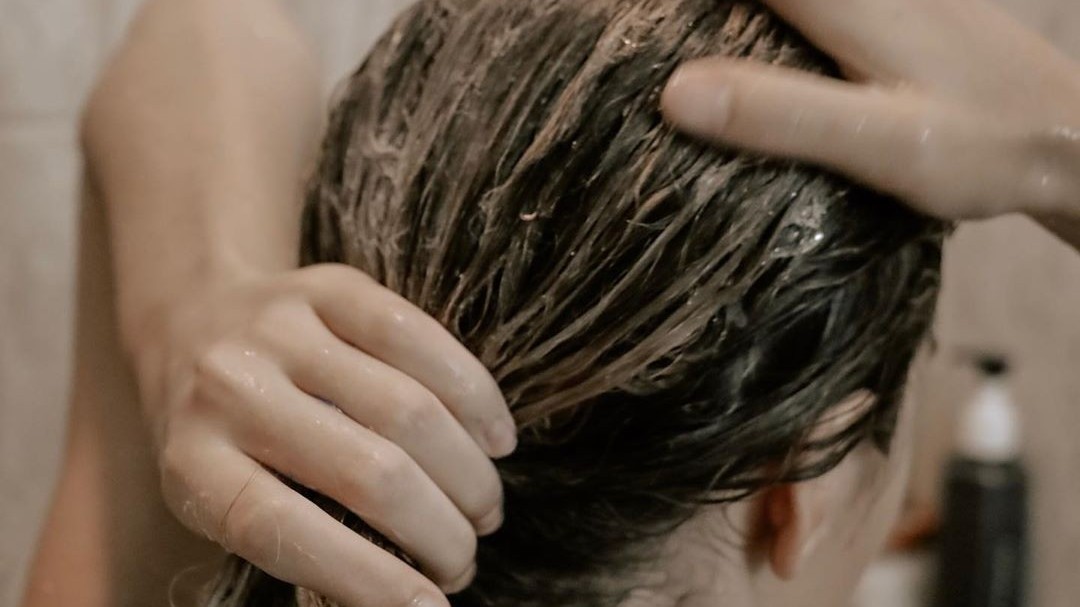Emma doesn't have a lot of hair. She's lived with alopecia on and off for 21 years, since her mom's passing at age 10. The stress of this event triggered her first bald spot. She shares, "I've also battled with ongoing anxiety and depression throughout my adult life, which have been triggers in my own hair loss - as is the case for many."
Emma now runs a blog called Lady Alopecia, from which she provides resources for other people dealing with this little recognized autoimmune disorder. Because unfortunately, Emma is far from alone in her experience of stress-triggered hair loss: "my hair loss itself (alopecia) is triggered by a range of things (genetics, diet, environment) but stress and hormone imbalance are often cited as the biggest reason. These things trigger an immune response to whatever internal or external stress you're under - whether it's chronic anxiety that you're internalising, difficulty sleeping or a sudden external stress, like a break-up, job loss or bereavement. Particularly in the wake of COVID, more and more people are discovering hair loss - due to the social anxiety that's hard to escape."
Blogs like Emma's are important both for relaying information, and for normalizing and de-stigmatizing the experience of anxiety and stress triggered hair loss. Because if you ask Dr. Nikola Djordjevic, medical advisor at HealthCareers, not enough people talk about the physical effects on hair that anxiety can have. "Anxiety takes a toll both on our physical and mental health. People suffering from anxiety can have headaches, nausea, rashes, and trembling, just to name a few. But nobody talks about hair loss."

Nutrients, anxiety, and hair loss
Dr. Djordjevic says that anxiety doesn't only affect the development of conditions like alopecia. "Anxiety-induced stress can cause hair loss by reducing the nutrients crucial for hair growth. When we're under stress, our body's muscles get tense, and there's an increase in hormones processed in the body. Since our body struggles to combat these issues, supplies of essential nutrients needed for hair growth diminish."
Anxiety is correlated with the loss of multiple essential nutrients, such as vitamin C, B vitamins, zinc, and iron. While we can't know for sure if the loss of these nutrients triggers increased anxiety or if the anxiety itself causes them to diminish, clinical literature has documented that these nutrients are necessary for successful hair growth.
Zinc's relationship with anxiety and hair loss/growth is especially interesting. According to evolutionary psychiatrist Emily Deans, "Zinc deficiency can lead to symptoms of depression, ADHD, difficulties with learning and memory, seizures, aggression, and violence... zinc is a cog in the machine in pretty much every signal and second messenger system you might have learned about in molecular biology classes. " Basically, running low in zinc could lead to your brain going a bit funky (or your brain being funky could lead to a loss of zinc -- it's a chicken or the egg situation).
 And zinc doesn't just impact your brain -- it's also needed for the growth and repair of cells in the scalp. Hair loss, like depression and anxiety, is a common symptom for individuals who have a zinc deficiency. But to be clear, if you happen to be simultaneously experiencing hair loss and depression and/or anxiety, we don't recommend that you immediately seek out a zinc supplement, since adding an unknown quantity of zinc to your body could lead to unwanted consequences. Nor will it address the root of the problem; in the words of Dr. Deans: "Extra zinc might help... but those are bailing buckets. What we really need is to correct the problem causing the boat to sink." Visit your primary care doctor or a psychiatrist instead.
And zinc doesn't just impact your brain -- it's also needed for the growth and repair of cells in the scalp. Hair loss, like depression and anxiety, is a common symptom for individuals who have a zinc deficiency. But to be clear, if you happen to be simultaneously experiencing hair loss and depression and/or anxiety, we don't recommend that you immediately seek out a zinc supplement, since adding an unknown quantity of zinc to your body could lead to unwanted consequences. Nor will it address the root of the problem; in the words of Dr. Deans: "Extra zinc might help... but those are bailing buckets. What we really need is to correct the problem causing the boat to sink." Visit your primary care doctor or a psychiatrist instead.
Anxiety induced hair loss is difficult to measure
So why aren't more people talking about the connection between anxiety and hair loss? Partially, a lack of clean-cut data is to blame. The majority of hair loss studies with experimental designs have involved mice, not humans, as participants -- it's not exactly ethical to subject a human participant to an exorbitant level of stress just to see if their hair will fall out.
And while those mouse studies have given us some good data, the problem is that the same effects aren't always seen in humans -- cognitively, we're far more complex than our furry little friends. There are some studies with human participants, but they're typically observational, not experimental, meaning they look for correlations between events but can't rule out potential extenuating contributors.
 That being said, the results of the human participant studies have proved informative. For example, in one 2017 study, female caucasion medical students between the ages of 21 and 32 who had no formally diagnosed mental or substance use disorder were tested for specific immune responses that can hamper the growth and re-growth of hair. The students were tested before, during, and after an extremely stressful round of final medical exams. The results were statistically significant, and the researchers running the study concluded "that in humans, naturalistic stress, as perceived during participation in a major medical exam, has the potential to shift the immune response to TH1 and transiently hamper hair growth." Obviously, this data needs to be replicated in other populations (men, non-binary people, older and younger individuals, people who aren't white) to find out if it's universally applicable, but it's an interesting start.
That being said, the results of the human participant studies have proved informative. For example, in one 2017 study, female caucasion medical students between the ages of 21 and 32 who had no formally diagnosed mental or substance use disorder were tested for specific immune responses that can hamper the growth and re-growth of hair. The students were tested before, during, and after an extremely stressful round of final medical exams. The results were statistically significant, and the researchers running the study concluded "that in humans, naturalistic stress, as perceived during participation in a major medical exam, has the potential to shift the immune response to TH1 and transiently hamper hair growth." Obviously, this data needs to be replicated in other populations (men, non-binary people, older and younger individuals, people who aren't white) to find out if it's universally applicable, but it's an interesting start.
Is anxiety induced hair loss permanent?
It depends on the type of hair loss. If the loss is because of alopecia, you may experience recurrent hair loss on and off.
But if the hair loss is connected to a single stressful event, it's likely temporary. Dermatologist Anna Chacon shares, "The most closely linked type of hair loss that relates to acute stress is telogen effluvium, in which a greater percentage of the scalp goes into a shedding mode. Normally 15% of our hair follicles are in the telogen phase, in which they are shedding or resting. In telogen effluvium, a greater percentage of the scalp is in telogen leading to excess shedding and hair loss." The effect is typically noticeable three months after the triggering event, but hair grows back and most cases resolve on their own within about six months.

Thirsty for more hair knowledge? Here's what to check out next:
Living With An Oily Scalp + Dry Ends
#unfair, right?
How Long Does It Take For Hair To Grow Back?
How long does it take for hair to grow back after a bad cut?
Is Hair Alive?
The answer might be a little more complicated than you thought 👀
How Often Should You Condition Your Hair?
Pro tip: Never EVER skip conditioner, unless you really want to damage your hair.



 And zinc doesn't just impact your brain -- it's also needed for the growth and repair of cells
And zinc doesn't just impact your brain -- it's also needed for the growth and repair of cells That being said, the results of the human participant studies have proved informative. For example, in
That being said, the results of the human participant studies have proved informative. For example, in
